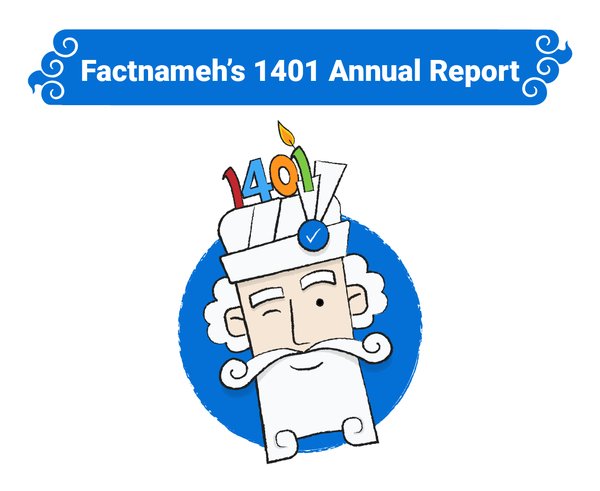
Misinformation Trends in Iran: A 2023-2024 Report by Factnameh
Misinformation Trends in Iran: A 2023-2024 Report by Factnameh
This blog post draws from the Factnameh Annual Report for the Iranian year 1402 (March 2023 - March 2024), originally published in Persian. The Factnameh Annual Report is usually published on April 2nd each year, which coincides with Factnameh's anniversary and International Fact-Checking Day, to provide insights and information about the various developments and trends that occurred during the previous year. You can read last year’s Factnameh Annual Report English summary (Year 1401) here.
Throughout the past year, Iran has played a prominent role in shaping regional dynamics through hybrid warfare tactics, combining military campaigns with information warfare strategies. Concurrently, internal political and social upheavals shaped the country’s domestic landscape, while the deteriorating economy has adversely affected millions of lives.
This backdrop fueled a surge in false information across Iran's information landscape, to which Factnameh responded by increasing its fact-checking output and implementing a range of other measures, as detailed in this blog post. Looking beyond the immediate challenges, this blog post begins with a brief overview of the enduring influence of Factnameh in Iran, before delving into a detailed account of the events that shaped the past year.
Fostering Fact-Checking Culture Across Media and Public Spheres
As the political landscape in Iran has grown increasingly volatile in recent years, so too has the proliferation of misinformation. Through fact-checking, Factnameh has not only countered misinformation and held perpetrators accountable, but it has also equipped the public with practical information verification skills. Today, fact-checking seems to have become increasingly prevalent within Iran's public discourse.
In a recent survey conducted by Factnameh among 1,203 Iranians aged 18 and older residing in Iran, 46% indicated that they make efforts to verify the accuracy of news reports, seek input from others, or reflect on its validity. Additionally, we have seen more Persian-language media organizations publishing fact-checking content or mentioning Factnameh’s work in their reporting over the past year. While we recognize that there is still much work to be done, these trends indicate a possible transition towards a more critical consumption of information, as individuals may now consider verifying the accuracy of claims before accepting them as true.
Factnameh: A Year in Review (March 2023 - March 2024)
In 1402 (March 2023 - March 2024), Factnameh produced 378 fact-checks, marking a 20% increase compared to 1401 (March 2021 - March 2022). The rise in misinformation is driven by regional conflicts and internal socio-political factors. During the mentioned period, Factnameh conducted fact-checks on a variety of topics, spanning regional geopolitics, economic matters, and political affairs.
The most investigated claims were related to the Hamas-Israel conflict, with 65 fact-checks conducted. Additionally, there were 54 fact-checks related to the economy and 45 fact-checks related to politics. Political topics that were fact-checked the most included the 13th parliamentary election, internet governance, and hijab-related issues, among others.
In addition, we published two in-depth reports. The first report provided a comprehensive understanding of the strategies and consequences of the state's disinformation campaigns during the Zhina (Mahsa) Amini protests, incorporating insights from more than 80 fact-checks published during the protests. These protests were sparked by the death of Zhina (Mahsa) Amini while in police custody for not following the Islamic dress code.
The second in-depth report published in 1402, titled "Iran's Filtering Contractors," thoroughly investigates the role of private startups in designing tools for online censorship and surveillance, particularly within the context of Iran's National Information Network (NIN), also known as "Iran's domestic internet." It commences with a policy analysis of Iran's Information and Communication Technology (ICT) landscape from its inception, highlighting the role of the Supreme Leader. Subsequently, it offers an in-depth examination of the involvement of several influential private entities in the development process of NIN.
This report is part of Factnameh's broader initiative, Internet Abad, which is dedicated to promoting transparency and accountability in Iran's ICT sector by uncovering the conflicting interests of government and private entities involved in online censorship and surveillance.
Iran's Role in Regional Rivalry and Information Warfare
Following the October 7th Hamas attack on southern Israel and the ensuing conflict in Gaza, Iran has played a significant role in supporting various non-state actors involved in the conflict. These proxies include militia groups such as Hamas in Gaza, Hezbollah in Lebanon, Houthis in Yemen, and various militia groups in Iraq. However, this support extends beyond logistics to include information warfare tactics, adding complexity and intensity to the conflict narrative.
Throughout this period, there was a coordinated effort by Iranian politicians, state media, and government-affiliated social media channels. They often utilized AI-powered tools to create manipulated visuals in support of Hamas. This included the dissemination of false claims by prominent figures such as Iran's Supreme Leader, who denied Hamas' involvement in the killing of civilians. Additionally, well-known Telegram channels affiliated with the Revolutionary Guards like BisimchiMedia also propagated similar misinformation. It is worth noting that there were also instances of misinformation from the other side, albeit on a smaller scale within the Persian information environment.
Election Fact-Checking: Iran’s 13th Parliamentary Election
On March 1st, 2024, Iran held its 13th parliamentary election, characterized by the lowest voter turnout reported since 1979. During this period, Factnameh published 18 fact-checks, investigating claims made by high-ranking officials surrounding the electoral process, as well as promises made by candidates.
A recurring theme in our fact-checks was the collective effort of officials, candidates, and state media to present the electoral process as equitable and participatory, while simultaneously downplaying the expected low turnout with misleading information. For instance, the Supreme Leader claimed that elections in Iran have always been conducted fairly despite the clear absence of an independent ombudsman and past controversies such as the disputed 2009 presidential election.
Top Fact-Checked Profiles
In 1402, the top-fact-checked profiles were predominantly governmental figures. Notably, the late Iranian President Ebrahim Raisi and his Information and Communication Technology Minister, Issa Zarehpour, were the most fact-checked profiles, with each of them being subjected to 11 fact-checks on their claims. Following closely behind was the Supreme Leader Ali Khamenei, with 8 fact-checks conducted on his statements.
Multimedia Content
Increasingly, fact-checkers, including Factnameh, are employing various multimedia formats like podcasts, videos, and social media updates to engage a broader audience, especially in the face of widespread misinformation. In addition to short videos and podcast episodes, in the year 1402, Factnameh released seven investigative documentaries covering a diverse range of subjects. (See the list below.)
- "Alternative Narratives": Exposes the state's attempts to disguise the killings of protestors during the September 2022 Zhina (Mahsa) Amini protests as either natural occurrences or incidents unrelated to the protests.
- "Is the Enemy Stealing Iranian Genes?": Explores the conspiracy theory of gene theft in Iran.
- "The Spread of Lies to Save the Hijab": Examines the production of fake news about the Hijab in Iran.
- "Goharshad: Fabricating History in Favor of Hijab": Uncovers the state's attempts to fabricate the history of the Goharshad incident to promote Hijab.
- "State Disinformation Campaigns in the 1401 Protests": Exposes the methods and impacts of the state's disinformation efforts during the 1401 Zhina (Mahsa) Amini protests.
- "State Hackers": Exposes the cybercriminal activities of hackers affiliated with the state in Iran.
- "Qassem Soleimani's Propaganda": Examines the Islamic Republic's use of propaganda to promote the former commander of the IRGC's Quds Force, Qassem Soleimani.
In addition to documentaries, Factnameh's weekly podcast gained significant popularity among Persian-speaking audiences this year. With the consistent release of 52 episodes, Factnameh established itself as a prominent podcast in the Persian news category on Castbox. In the year 1402, Factnameh's podcast achieved over 369,000 downloads, showcasing a remarkable 42% increase compared to the previous year.
Social Media
Factnameh's social media accounts collectively boast over 200,000 followers. With more than 87,000 followers on Instagram, around 56,000 on X (formerly Twitter), over 44,000 on Telegram, and nearly 15,000 accounts on Threads, Factnameh's social media channels have gained a total of 42,000 new followers compared to the previous year (1401). This represents a 21% increase in followers across all platforms.
The Lie of the Year
In the closing days of the year, Factnameh extended an invitation to its audience to choose the "Lie of the Year" from a curated list of 10 options. These ten topics were shortlisted based on the potential impact of the falsehood and the level of engagement from our audience.
With the audience's votes, our "Lie of the Year" for 1402 goes to the statement from the Supreme Leader: "In which countries around the world are elections held for various matters, and what are some examples of these elections?" This statement was selected by our audience from among the options provided.
This statement likely resonated with the audience due to its implications within the context of Iran's political landscape. It suggests a restriction on democratic processes, raising concerns about the transparency and inclusivity of decision-making in Iran. Given the historical and ongoing debates surrounding political freedoms and civil liberties in the country, such a statement carries significant weight.



